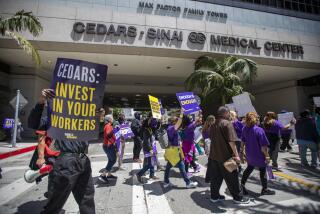Big pension in little Salinas
- Share via
Yet another local government agency in California is under fire for the seemingly outsized compensation paid to one of its employees. This time the spotlight is on the Salinas Valley Memorial Healthcare System and its recently retired chief executive, Samuel Downing. The controversy isn’t Downing’s $150,000 annual pension as much as the $3.9 million in supplemental retirement benefits awarded by the healthcare system’s board.
Downing’s employers defended the supplemental payments, saying that consultants found them to be in line with what “comparable organizations” pay. But as The Times’ Sam Allen reported Wednesday, Downing’s package was far more generous than those promised to administrators of several larger public hospitals.
Tales like this one illustrate the challenge that public agencies face as they try to run big, costly programs effectively, whether hospitals or universities or prisons. They have to compete with the private sector to attract and keep talented administrators, and applicants may not be willing to take a much lower salary to work for government. But many taxpayers recoil from the idea of paying top dollar for top talent, arguing instead that work in public service requires a sacrifice.
Pensions in the public sector have become a particular sore point because they reward longevity, not performance, and because few private-sector employers provide them any longer to the rank and file. They’re also straining some city and state budgets, leading lawmakers to press public workers — most of whom make a fraction of Downing’s salary — to accept reduced benefits.
By contrast, Salinas Valley jumped through extra hoops to build Downing’s retirement kitty, splitting his supplemental benefits into seven different accounts to evade the caps that the Internal Revenue Service places on tax-deferred retirement plans. Almost a quarter of those benefits were added after Downing turned 65 in 2009.
The president of the healthcare system’s board said it was in the best interests of the hospital and its customers to retain Downing, who presided over a significant expansion of the system before shrinking revenue and demand forced it to contract. And as generous as Downing’s retirement benefits may be, the board structured them in a way that shouldn’t threaten its future finances.
Nevertheless, public agencies must balance the need to attract capable people against the rest of their funding responsibilities as well as the risk of provoking public resentment. The lengths the board went to in padding Downing’s retirement even as the hospital’s fortunes were declining and the state’s economy was foundering upset that balance.
More to Read
A cure for the common opinion
Get thought-provoking perspectives with our weekly newsletter.
You may occasionally receive promotional content from the Los Angeles Times.






